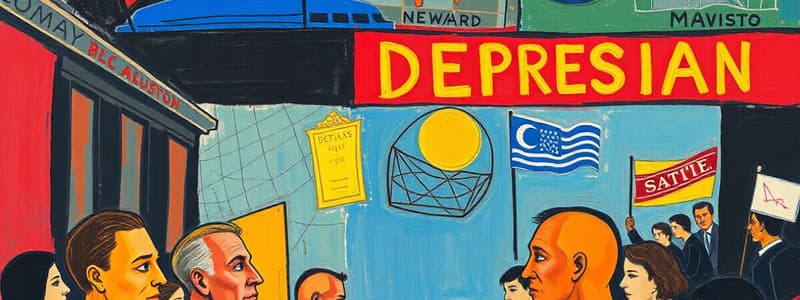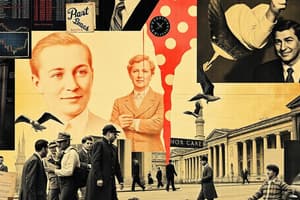Podcast
Questions and Answers
What is considered the primary event that triggered the Great Depression?
What is considered the primary event that triggered the Great Depression?
- World War I
- Bank Runs
- Stock market crash of 1929 (correct)
- Agricultural tariffs
What is meant by 'margin' in the context of investments during the Great Depression?
What is meant by 'margin' in the context of investments during the Great Depression?
- The amount deducted from earnings for expenses
- The difference between the buying and selling price of a stock
- The profit made from selling stocks
- Borrowing money from a broker to buy stocks (correct)
Which demographic group faced the highest rate of unemployment during the Great Depression?
Which demographic group faced the highest rate of unemployment during the Great Depression?
- Women
- Elderly individuals
- African Americans (correct)
- Men
What did Herbert Hoover believe about government assistance during the Great Depression?
What did Herbert Hoover believe about government assistance during the Great Depression?
What term describes the areas of makeshift housing that sprang up during the Great Depression?
What term describes the areas of makeshift housing that sprang up during the Great Depression?
Which of the following was NOT a significant cause of the Great Depression?
Which of the following was NOT a significant cause of the Great Depression?
What psychological effects did the Great Depression have on the populace?
What psychological effects did the Great Depression have on the populace?
What was a significant impact of the Dust Bowl during the Great Depression?
What was a significant impact of the Dust Bowl during the Great Depression?
Which of the following factors directly contributed to the economic strain leading to the Great Depression?
Which of the following factors directly contributed to the economic strain leading to the Great Depression?
What is meant by 'speculation' in the context of the stock market during the Great Depression?
What is meant by 'speculation' in the context of the stock market during the Great Depression?
How did the Great Depression specifically affect rural areas?
How did the Great Depression specifically affect rural areas?
What term describes the belief that individuals should rely on their own efforts for success, as popularized by Herbert Hoover?
What term describes the belief that individuals should rely on their own efforts for success, as popularized by Herbert Hoover?
What event is specifically referred to as Black Tuesday?
What event is specifically referred to as Black Tuesday?
What was a significant social change during the Great Depression regarding the workforce?
What was a significant social change during the Great Depression regarding the workforce?
Which of the following best describes the conditions for African Americans during the Great Depression?
Which of the following best describes the conditions for African Americans during the Great Depression?
What impact did the Great Depression have on children's families?
What impact did the Great Depression have on children's families?
What economic event is associated with a significant decline in industrial productivity during the Great Depression?
What economic event is associated with a significant decline in industrial productivity during the Great Depression?
Which of the following statements about the Dust Bowl is accurate?
Which of the following statements about the Dust Bowl is accurate?
What was one of the psychological effects of the Great Depression on individuals?
What was one of the psychological effects of the Great Depression on individuals?
What term describes the practice of forecasting stock market trends during the Great Depression?
What term describes the practice of forecasting stock market trends during the Great Depression?
How did the Great Depression alter social norms regarding the workforce?
How did the Great Depression alter social norms regarding the workforce?
Which of the following best describes the experience of the elderly during the Great Depression?
Which of the following best describes the experience of the elderly during the Great Depression?
What was one significant impact of the economic environment of the Great Depression on children?
What was one significant impact of the economic environment of the Great Depression on children?
What is the definition of 'rugged individualism' as articulated by Herbert Hoover?
What is the definition of 'rugged individualism' as articulated by Herbert Hoover?
Flashcards
Great Depression
Great Depression
A long period of severe economic hardship with widespread unemployment, poverty, and business failures.
Black Tuesday
Black Tuesday
The sudden crash of the stock market on October 29, 1929, marking the beginning of the Great Depression.
Rugged Individualism
Rugged Individualism
A belief that individuals should rely on their own efforts and not on government assistance to succeed.
Dust Bowl
Dust Bowl
Signup and view all the flashcards
Shantytowns
Shantytowns
Signup and view all the flashcards
Margin Buying
Margin Buying
Signup and view all the flashcards
Credit
Credit
Signup and view all the flashcards
Margin
Margin
Signup and view all the flashcards
Buying on Margin
Buying on Margin
Signup and view all the flashcards
Hobos
Hobos
Signup and view all the flashcards
The Great Depression
The Great Depression
Signup and view all the flashcards
Laissez-Faire
Laissez-Faire
Signup and view all the flashcards
Hoover's philosophy on government
Hoover's philosophy on government
Signup and view all the flashcards
Study Notes
The Great Depression
- Economic depression: long period of severe economic downturn, high unemployment, and widespread hardship.
- WWI impact: economic strain from war, national debts, disruption of global trade, and overproduction, triggering the crash.
- Stock market crash of 1929: triggered the depression, leading to bank runs and decreased investment.
- Income inequality: significant disparity in wealth distribution, contributing to the economic crisis.
- Credit and debt: excessive borrowing and speculation in the stock market.
- Agriculture struggles: crop failures, drought, overproduction leading to low crop prices/income for farmers.
- Tariffs: trade barriers negatively impacted international commerce, contributing to the decline.
- Herbert Hoover's presidency: he believed in rugged individualism and minimal government intervention, a philosophy criticized by many.
- Speculation: gambling on the stock market rather than investing in the long-term value of businesses.
- Black Tuesday: October 29, 1929, the date of the stock market crash.
- Margin: borrowing money from a broker to buy stocks.
- Credit: the ability to purchase goods with the intention of paying later
- Dustbowl: severe drought and dry conditions in the Midwest, worsened by poor agricultural practices.
- Bank runs: widespread withdrawals from banks due to fears of bank insolvency.
Rural Areas Effects
- Agricultural decline: crop failures, drought, overproduction, and large winds led to low crop prices/income for farmers. This created widespread poverty in rural communities.
- Shantytowns: poor residential areas developed from makeshift housing, visible in rural areas.
Urban Areas Effects
- High unemployment: widespread joblessness, leading to homelessness, poverty, and abandonment in urban areas. Difficulty finding jobs increased, especially for minorities.
- Shantytowns: poor residential areas developed from makeshift housing visible in urban areas.
Impact on Children, Elderly and Minorities
- Children faced hardship: abandoned, sent to work to help families survive, as well as poverty.
- Elder poverty due to lack of savings and limited resources.
- African Americans experienced even higher unemployment rates compounded by racial discrimination. This discrimination worsened economic challenges for minorities.
Social Norms and Impacts
- Women entering workforce: increased participation in the workforce due to economic necessity.
- Psychology impacts: anxiety, fear, and depression were common responses to the hardship of the Great Depression.
- Hobos: homeless people wandering the country looking for work.
- Shantytowns: poor residential areas developed from makeshift housing.
Economic Philosophies
- Rugged individualism: the belief that individuals should rely on their own efforts, a philosophy criticized for not providing enough assistance during the crisis.
- Laissez-faire economics: minimal government intervention in the economy, a prominent viewpoint during the Great Depression that was widely criticized.
- Trickle-down economics: suggested benefits for the wealthy would benefit the overall economy, but this approach demonstrated limited effectiveness.
Hoovervilles
- Makeshift shantytowns: built during the depression by those who lost their homes, a stark visual of the widespread poverty and desperation.
Bonus Army
- WWI veterans: marched on Washington D.C. to demand early payment of promised bonuses, highlighting the economic hardship of veterans.
Studying That Suits You
Use AI to generate personalized quizzes and flashcards to suit your learning preferences.



